HHS secretary unveils groundbreaking five-month plan to discover things scientists have known since 1977.
An autistic scientist explains the science of autism in about 5000 words.
So I watched Robert F. Kennedy Jr.’s April 16 news briefing and then read the CDC’s research paper on autism that prompted it, including the supplemental materials! Let me tell you, it was a riveting afternoon that left me wondering, “Has he tried not being this way?”
It appears that the first big issue that gets Bobby off the couch and wearing his HHS director pants is…
…wait for it…
autism.
Autism? Really? It was not what I had expected, especially given the current measles situation. The entire press conference would have been better suited as an audition tape for the “Most Anti-Science Man” contest. To be fair, we knew about him beforehand, but seeing it play out on the national stage is sobering because now he’s the guy in charge. It was an embarrassing display of ineptitude.
Experts are united only in their disagreement with RFK Jr. Eight leading autism organizations, which famously disagree on multiple issues, all signed this letter together:
“We are deeply concerned by growing public rhetoric and policy decisions that challenge these shared principles. Claims that Autism is “preventable” is not supported by scientific consensus and perpetuate stigma. Language framing Autism as a “chronic disease,” a “childhood disease” or “epidemic” distorts public understanding and undermines respect for Autistic people.”
Here’s what the paper itself said.
One of my (autistic) hobbies is reading scientific research papers. So often, the news article about new research is a layman’s spin on what they think the paper says versus what it really says. What did the paper say that prompted this entire press conference?
It doesn’t discuss the cause of autism; it just states the prevalence. The study found that autism prevalence went up from 2020 to 2022. Actual numbers vary by each of the 16 geographic locations, but the study’s average for 2022 is 1 in 31 in the United States.
“Autism rates are up.” That’s the entire scope of the paper.
The farthest it goes in assigning cause to the increase in autism is pointing out how many more non-white children are getting diagnosed and discussing the ways that recent interventions, such as increasing eligibility, better diagnostic criteria, and access to services, have affected the prevalence rate by race.
So no, the paper doesn’t support RFK Jr. either.
What happened at the presser?
His misinformed “talking points” about autism have drawn the ire of everyone who has autism, too, including me. This is my community. Days later, it still feels dark.
Don’t get me wrong, I don’t object to autism research or increasing support for autistic people. He’s not offering that, though. In short, he wants to eradicate autism by eliminating the toxin that he believes is causing it.
What, you’ve never heard of an autism toxin? Yeah, me either. Add that to the long list of things RFK Jr. spouted without evidence. Here’s a summary of what he said to save you the time of watching the whole thing:
RFK Jr. says autism is “relentlessly trending upward.” He believes we are “suffering” from an autism “epidemic.” RFK Jr. was discussing it like someone might talk about an infectious disease. He calls it a “real public health phenomenon” and later an “urgent public health crisis.”
RFK Jr. wants us to move away from the idea that the increase in the rate of autism is a result of better diagnosis, recognition, and improved criteria, because he believes the real cause is environmental. He consistently mentions a toxin as a cause and says that research into genetic causes is a “dead end.”
His discussion of previous research on autism is weak, including logical fallacies and a misunderstanding of the distinction between correlation and causation. He tries to provide proof, but his explanations range from flimsy to non-existent.
He stresses that autism is a "preventable disease.” He believes we are “doing this to our children.”
He implies that anyone who disagrees with him is wrong: “You have to believe that scientists of the past were stupid.” He added, “All you have to start doing is reading a little science,” and to “use common sense.” He referred to those who believe differently in their “mythology” as “epidemic deniers.”
He grossly misrepresents who autistic people are by only talking about autistic people who have more severe symptoms in stereotypical ways (nonverbal, hand flapping, toe walking) and then only discusses them in terms of productivity or attractiveness: never pay taxes, hold a job, date, or use the toilet unassisted.
He claims, “autism destroys families and children” and that the press isn’t paying attention.
When asked what environmental causes might be explained, he mentioned mold, food additives, pesticides, water, ultrasound exposure, obesity, parental age, and diabetes.
He’s concerned about “astronomical” healthcare costs. (THERE IT IS!)
He will push for new studies to find the answers to autism and expects the first answers by September.
There's a lot to unpack here.
Mr. Kennedy, sir, you couldn’t assemble a team of investigators by September, let alone complete an entire scientific study from start to finish in less than five months. How will someone design a study, conduct it, analyze the data, write it, get it reviewed, and publish it in that timeframe? Spoiler alert, they aren’t. Katy Perry is more likely to become a real NASA astronaut and record her next album on the moon in that timeframe.
RFK Jr.’s insistence that this will happen is deeply unsettling. It’s the same way you wouldn’t hire contractors who claim they can renovate the kitchen in an afternoon. The timeline itself makes me question their competence.
The main issue is that RFK Jr. does not understand how science works, and that’s a real issue because that’s his whole job as chief-health-science-director-man. Autistic people were the last group that needed this sort of treatment.
I tried to replay his argument in my head, “So let me get this straight, he’s saying that autism isn’t genetic and that genetic diseases don’t cause epidemics. Therefore, autism must be an epidemic?”
There’s only one problem with that: scientists agree that genetics is the main cause of autism.
As he wrapped up, he dared to say he plans to follow science wherever it leads. Clearly, that’s not the case because no one who follows science believes that genetics is a “dead end.” His words, not mine.
So let’s talk about what we know about autism, so you can so you understand why RFK Jr. is batshit crazy, instead of just taking my word for it. I live with autism, and one of the very autistic quirks of (some) people with autism is that they are also autism experts and are delighted to talk about it anytime. As you may have predicted, that’s about to be your problem.
So, what do we know about autism?
Autism is explained mostly by genetics.
The current research on autism shows that roughly 80% is genetic, although that number can vary depending on the precise study. (If you prefer to see the sources yourself, you can read meta-analyses here and here about some of the twin studies that show strong genetic links and encompass a wide range of individual studies. Here’s the first paper that demonstrated a genetic link.)
RFK Jr. said repeatedly that genetic factors don’t cause epidemics. To his credit, that’s true. But for his autism epidemic to be real, it would need to be caused by something other than genetics. It’s not. Case closed.
Scientists agree that environmental factors contribute to autism, but they haven’t determined exactly what those are. Environmental factors likely interact with genetic predisposition, thereby creating much of the complexity in understanding autism. Also complicating things is that because families, by definition, often live together, it’s hard to separate genetic vs. environmental causes.
Autism rates are rising.
We also know that autism rates are rising. In 2000, the rate was 1 in 150 children. The 2025 paper referred to in the press conference estimates the current autism prevalence to be 1 in 31 children. The paper's discussion section provided explanations:
more women and girls are being diagnosed (which is supported by the decrease in the male-to-female ratio)
improvements in identifying and diagnosing autism
changes in insurance coverage
effective targeting of underserved groups (supported by a diagnosis of more non-white children)
less of a wait-and-see approach as a result of the push toward early intervention
RFK Jr. made the mistake of focusing on prevalence in isolation and overlooking how significant policy changes affect it. These are well-documented and consistent with decades of underdiagnosis.
Some people have used the prevalence of left-handedness to explain this. The number of left-handed people can’t go up exponentially forever. It goes up until it levels out once everyone is identified. This is true for gay and trans people as well.
The increase is not explained by some novel toxin, even if RFK Jr. tries to make it true by clicking his heels.
Autism research is in the early stages.
Autism itself is not new, but the diagnosis of it is. The first case was diagnosed in 1943, so by definition, all of our research has happened after that date. That’s just 82 years. Autism studies are trying to land on a moving target that gets closer to the answer with each iteration of research, but we are in the middle of that process, not the end.
One part of the press briefing that blew me away was when RJK Jr. was defending older scientific research showing autism was rare: “Doctors and therapists in the past were not stupid.”
No one says they were. They were working with the information they had at the time, without the benefit of a better understanding of human development, larger sample sizes, genome sequencing, or modern computer analytics. Their findings were accurate in the context of the specific research they did at that time.
Unlike some of us (cough, cough RFK Jr.), scientists are perfectly comfortable when newer science proves them wrong—that’s what makes the scientific process thrive. Science is an iterative process: when we know more, we update the textbooks to reflect that. I feel pretty confident that within a year, something I’m writing about autism here today will become outdated. I’ll even believe in a mystery toxin theory if there is actual scientific evidence to back up that claim!
Autism is complex
Autism doesn’t fall neatly into categories like some diagnoses. A doctor can usually tell whether you have measles during a single doctor visit. Not so much with autism. It wants to avoid being put in boxes as much as football coach Mark Bryan in his skirts and heels.
Autism is a disability.
It’s not an infectious disease.
It’s a neurotype.
It’s a developmental condition.
It’s not contagious.
It’s sensory issues.
It’s integral to who someone is.
Because it affects how the brain is wired, autism is often woven into someone’s identity—the two cannot be separated.
Autism does not destroy children.
RJK Jr. believes autism destroys children. Before we even begin to consider what autism does, let’s pause to consider what other things destroy children.
polio?
car accidents?
childhood sexual abuse?
muscular dystrophy?
The only thing that should destroy children is the talented, athletic group of teachers who volunteer for the staff vs. student basketball game.
Nothing can destroy a child for any reason. Sure, autism can present a lot of challenges, especially for those who have a higher degree of functional impairment.
Does a child need help getting to the restroom or a communication device? Ok then, they should get those things.
Do we need to have a conversation about the dating potential of an autistic child to address how best to research autism? No.
Since when do we bitch about the cost of childhood cancer treatment? (Aside from the critiques of the US healthcare system.) We should expect insurance to cover autism treatments and create a GoFundMe for excessive medical expenses, just like everyone else.
Autism can be a challenge, but that’s not what the hard part is. It’s having to exist in a world that doesn’t seem to want to understand them. Us. I’m talking about me when I say these things.
The enemy isn’t us. We aren’t responsible for any destruction.
Autism is a spectrum, but not how you think.
Most people think of a spectrum as having more or less of something: from the barely discernible to the walking, talking definition. That’s not the best way to think about the autism spectrum, and changing how you imagine it will help you understand autistic people.
Autism can vary in severity, and the different departments of someone’s brain are affected: motor, sensory, social, and cognitive. This is an excellent visual of what I mean. When you’ve met one autistic person, you’ve met one autistic person. We come in a lot of different configurations.
Autism is misunderstood.
I would never have been tested for autism in the 90s. For starters, I was getting straight As and could make great eye contact with adults. Now that I’ve put more pieces together at age 40, I can see how I was affected both as a child and now as an adult. I’m surprised at how much my autism affects my daily life now that I know what to look for. When I was diagnosed, I fundamentally shifted my relationship with how I understood myself as a person. It’s a common experience, especially with women diagnosed later in life.
While I owe zero explanations, the circumstances around my diagnosis demonstrate this misunderstanding well. A few years ago, during a period of better insurance coverage, I got an autism evaluation after a conversation with my therapist. It was at least four appointments and took several months.
He gave me a “provisional” diagnosis of autism, pending completion of an expensive, observational test that insurance didn’t cover. I met all the criteria for autism. His rationale for not providing a diagnosis despite that evidence was that all of my “atypical” findings could be explained by somatic symptom disorder, a disorder I had never heard of that showed up in the testing.
He wrote in the “Personality Assessment Inventory” section: “Jessica’s personality profile reflected elevations on the following scales: SOM (SOM-S/H) scales, which suggest significant concerns about somatic functioning and probable impairment arising from somatic symptoms. Individuals scoring in this range are likely to feel that their health is not as good as that of age peers and to believe that their health problems are complex and difficult to treat successfully. Jessica’s profile of scores is the same range of those that may present as unhappy, complaining, and pessimistic.”
Concerns? Feel? Believe? People “believe” myths and conspiracy theories. What does any of this have to do with whether I have autism? My health IS not as good as that of my age peers. My condition IS complex and difficult to treat successfully.
It’s a provable fact: I’m disabled by MECFS, a medical condition that requires me to adjust nearly every facet of my life to accommodate my disability. He asked me many detailed questions about that, although that’s not why I sought his help.
After days of testing, the best he could come up with is a diagnosis that amounts to disabled-person-thinks-about-her-body-a-lot. It’s a diagnosis often used when there are no medical explanations for someone’s illness—the “hysterical woman” diagnosis. For the record, he made these statements without ever seeing my medical records. Even trained professionals can’t seem to understand anything other than a textbook case of autism.
Thankfully, my therapist and psychiatrist have come up with a plan to treat me effectively, and we think it’s pretty safe to say I’m autistic. My experience with this isn’t unique.
People also misunderstand autism as something autistic people do not like about themselves or want to change. I can’t speak for everyone, but I am not alone when I say I don’t want to be “fixed.” Autism is the glue that holds me together. It’s not painted on the surface and can't be easily wiped away with a wet rag.
Imagine a wall held together by mortar. You can’t remove the mortar without also destroying the wall. You can’t stamp out the autism in a person without taking them hostage in the process. And it’s ok if that doesn’t make sense to you. It wouldn’t have made sense to me a decade ago either.
Interventions aren’t about making people less autistic.
Early intervention or autism support isn’t like applying a treatment three times a day until the autism is gone. It’s about helping individuals learn how their brain works and how to work with it to live happy lives.
The hard part is that autistic people aren’t understood, supported, or accommodated. The world’s systems were not designed with us in mind, so we all have to mold ourselves to fit into everything, all of the time. That extra work is viewed as a symptom instead of being seen as the adaptive behavior that it is.
Swinging and rocking serve a purpose: they help someone regulate their nervous system from the inside out. You’d probably do that too if it kept your brain organized.
Wearing headphones in everyday situations helps someone calm their nervous system from the outside in. You’d probably do that too if you were sensitive to certain noises.
Non-verbal communication helps someone tap into pathways in their brains that are easier to access. If talking was difficult, you’d do that too.
But those are the more visible differences. Autistic people are also applying strategies to time management, social interactions, mental health, and everyday tasks like grocery shopping.
Oftentimes, those individualized hacks are very specific. Here’s a great example:
Pause for story time featuring a real person with autism.
A great example of this was shown on national television a few weeks ago. The kids and I have been watching Survivor 48. (Spoilers only if you click the videos.) It’s about a third of the way through the season, and two players have formed a strong bond: Joe Hunter and Eva Erickson. Joe is a firefighter and exudes respectful, protective dad energy. Eva is a 20-something grad student with autism. When she was diagnosed with autism at age one, doctors said she would never hold a job or live a normal life. “That, at most, I could hope to marry someone else with autism." She’s precisely the sort of child that RFK Jr. says destroys families.
Eva had disclosed her autism to Joe early on, but only to him. She wanted to make sure someone else knew how to support her if she experienced an “episode” during filming. Joe thanked her for sharing and agreed to help if she needed it. They practiced the squeezing movements that help her regulate. She also described what signs he can look for to identify her episodes.
Fast forward. Eva is visibly struggling with a frustrating puzzle. Joe is watching her intently. The event finishes, and Eva’s emotions flood out of her. It almost looks like she’s in pain. Her team is hugging her and is oblivious, mistaking her reaction for relief that the challenge was over. Jeff Probs, the host, doesn’t know about any of the previous conversations. Everyone is silent until Jeff offers to break protocol and invites intently watching Joe to comfort Eva. You can watch the scene unfold here:
Joe correctly identifies this as an episode, and after two rounds of squeezes, Eva takes a few deep breaths and exhales with a big smile.
I’ve watched almost all 48 seasons of Survivor, and this was the first time I’ve ever seen Jeff Probst cry but I was right there with him.
Eva knew what super-specific thing helped her manage her autism and successfully navigated a situation no one can prepare for. Here, you can watch Eva debrief with Jeff in front of the contestents and fill everyone in for the first time in her own words:
Autistic culture is a real thing.
I speak from experience as early 90% of my social circle is autistic, and we would all agree that the autism community is a happy, joyful people. We know we are weird to everyone else.
Autism exists in a rich culture of color, art, shared experiences, inside jokes, communication styles and ways of being.
In related news, autism community has reached whatever magical threshold is required to receive its own dating show. Compared to standard dating shows, Love on the Spectrum provides a healthy dose of wholesomeness.
I have feelings about the show because I don’t always appreciate how they amplify the awkwardness with sound effects and extended pauses. It makes me imagine if someone gave my real-life sound effects. I can't imagine it being enjoyable to hear a bloop sound while the camera zooms in on my neighbor’s reaction to me unintentionally oversharing as we talk in the driveway. Absolutely not.
But the show sends viewers walking away thinking, “Maybe I wouldn’t date this guy myself, but I would love a relationship where my partner and I are on the same wavelength like Connor and Georgie.
Contrast this with RFK Jr. who dug up and moved his former wife’s grave without notifying her family after some claim he drove her to suicide during their divorce. Sorry, didn’t mean to ruin that wholesome moment for Connor and Georgie with that mental image. Just comparing and contrasting.
Older autistic people exist.
RFK Jr. defended his “relentlessly trending upward” case by pointing out that he has never seen a head-banging, toe-walking adult. It “must be a toxin” because he’s never met an autistic adult.
The first person diagnosed with autism died only a few years ago. Is his impression of how many autistic boomers there are based on how many people he sees with one specific typo of gait in the course of a day?
The argument “I personally haven’t seen it, therefore it must not exist” is not common sense. You know what existed long before we had eyes on it? Antarctica. Malaria. Gravity. Dinosaurs. UV light. Evolution. Uranus.
It would violate HIPAA to peek at their medical records, but evidently, Mozart, Einstein, Newton, Darwin, and Dickinson were autistic. I think it’s safe to say that our understanding of some niche topics is a direct result of the hyperfocus of at least a few autistic ancestors, probably many more.
Also uncounted in autism statistics is the roster of eccentric aunts and uncles. I’m the first to admit the autistic stereotype exists for a reason.
Does RFK Jr. realize that many autistic kids were assumed to have a mental illness and sent to institutions? That “profoundly autistic” children weren’t diagnosed at all—and in the vernacular of someone in the 1960s, they were labelled “retarded” and sent away. They were more interested in containment than diagnostic precision.
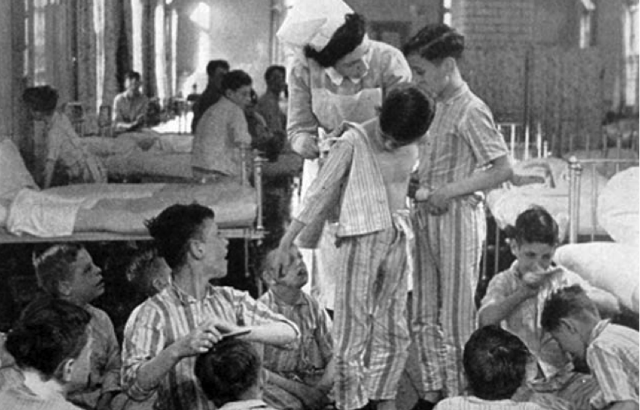
Autistic kids who were in school didn’t get the support of pre-K or trained clinicians. Instead, they got an elementary school teacher who used corporal punishment when they couldn’t behave like the other students. How much you want to bet that their outcomes weren’t great either?
It’s entirely conceivable to me that so many kids were missed because our understanding of autism almost 50 years ago was drastically different from what it is now. Decades of research have really changed the landscape of who is being diagnosed. That more consistently includes anyone who is female, non-white, or from a mid to lower socioeconomic class.
Anecdotally, the autism community sees a fair number of parents of kids with autism are diagnosed at above-average rates once they learn more about autism and realize the tree actually resembles the apple after all, which would make sense if it’s genetic.
Environmental factors contribute to autism, but vaccines do not appear to be one of those factors.
If you haven’t read about the history of vaccines and autism before, my friend Shannon Dingle wrote a great refresher. It’s more than some dude being a little bit wrong—think a businessman with a conflict of interest desperately wrings out a research paper using bad science that conveniently proves his point for financial gain.
Some people do insist that vaccines are to blame, with anecdotes of autistic people who have experienced regression soon after a shot. Scientists have specifically searched for a link in large data sets but never found causation.
Humor me and put on your nuance hat when you read this next part.
If children who are genetically predisposed to autism experience an environmental factor that interacts with their genes, who says a vaccine couldn’t be that trigger in a small subset of people? I want to be perfectly clear that does not mean vaccines cause autism. They don’t. But someone could insist that a vaccine triggered their child’s autism, and it doesn’t actually conflict with current science. Immune systems are fickle in a small group of people.
I like to gain credibility by preempting people’s questions and clarifying them upfront: vaccine injuries do happen. Sometimes, rare and unpredictable side effects can happen. Some people see these instances as proof of safety issues.
Consider this: a small number of people are harmed by cars, but they are generally considered safe to use on a regular basis. Most people agree that the cost-benefit ratio is in their favor. The same is true for fresh vegetables, airbags, spinal taps, and vaccines. Oftentimes, there are programs that mitigate the risk of harm, like car insurance or food testing. The point is, you can’t cherry-pick data and say, “Well, my coworker Frank got into a car accident on Tuesday, therefore cars aren’t safe.”
Patients with vaccine injuries are supported by the Vaccine Injury Compensation Program (VICP). The whole reason it started was that they couldn’t establish a causal link with any vaccine, unlike other harmful things that demonstrated clear causal links, such as cigarettes, thalidomide, or tanning beds. Elizabeth Booker Houston explains how public health officials solved two problems with one solution: VICP.
Autism research should follow the science.
I have strong personal feelings about all of this because scientific-flavored misinformation that will not die is at the center of why I can’t get decent medical care for my MECFS.
Our version of the “vaccines cause autism” saga is “exercise and talk therapy effectively treat MECFS.” Despite being disproven, that myth also lingers like the flame of a trick birthday candle. But instead of just hearing it from alternative facts media suits, we’re hearing it from our actual doctors. I’m not saying that’s worse. Actually, I am: it is absolutely worse. Doctors will believe thoroughly debunked science, even when it harms their patients.
Think you’re immune to believing bad science? How many of you clean by mixing baking soda and vinegar? What if I told you that the bubbles do not provide magical fizzy cleaning action? They simply neutralize each other. When you mix baking soda and vinegar, you get a mild salt that’s akin to table salt. You are cleaning with basically water that can’t do much.
Baking soda alone? Fabulous. Vinegar alone? Fantastic. Mix them? Instead of going dancing to a club with live music at 11pm, it’s like arriving at 9am when all the lights are on. It might do the job, but not in most situations. And yet, people parrot it like scientific fact. And yes, thanks for asking, this is a hill I will die on and I am thrilled to work it into an essay.
Science doesn’t have a complete explanation for autism yet, but as you can see, there is a lot we do know.
But people are uncomfortable when they can’t explain things completely. They cannot accept that there are no treatments, tests, or cures for my illness. Instead they recommend acupuncture, supplements, and that one naturopath that helped them personally with another condition entirely. They cannot understand that I am sick no matter what foods I eat. They desperately seek a cause and affect to reassure themselves.
It’s how we get someone approaching a grieving mother and saying, “It was his time” about her infant. People will justify the death of a child before they will admit that some things just don’t make sense.
Luckily, we have solved many a puzzle using science, and my hope is that autism is added to that list as research progresses. In the meantime, all the autism community is asking for is to acknowledge that society isn’t set up for us, that there are more of us than expected, and that we should get a little extra slice of the pie to ensure all of us get the support we need.
Why were RFK Jr.’s comments so dark?
Instead of sharing the truth about autism, which I’ve just written out for you, he tried to get away with describing the autistic community as a wasteland of humanity crawling with people he sees as useless.
You cannot eradicate a genetic condition unless you eradicate the people with the genes. Of course, he didn’t come out and say that directly but he term for preventing a genetic condition already exists, and it’s spelled e-u-g-e-n-i-c-s.
RFK Jr. snuck in a few snippets that sounded paranoid too. “There are people who don’t want us to look at environmental exposures.” He said he wants to lift the “taboo” on autism research. He’s going to stop Big Whatever from profiting by “putting toxins in our food.” Families are being destroyed. Epidemic. Children who need 24/7 care. Eradicate. Urgent public health crisis. Failing our children. Toxin.
Trump honed in on autism in his address to Congress, and now RFK Jr. is continuing to play word association with autism, toxin, epidemic, and crisis.
It doesn’t really matter what is true. They know that people would rather believe a flawed narrative that makes sense to them than admit something isn’t fully understood. Truthfully, people are afraid it could happen to them.
I keep asking myself, why would RFK Jr. stress such an unrealistic timeline? It dawned on me. It will take just 5 months to clear out scientists who won’t buy into Trump’s “toxins cause autism” myth. Then they can declare victory for the scientists who are no longer “fearful.” Pseudoscience “experts” can claim vaccines they have “proven” that “toxins” that cause autism. Then they can start blaming parents and turning autism into something people choose. Soon after, they can label autism support as a costly thing for taxpayers to cover for people’s “personal choices.”
But doesn’t matter to them that genetics causes autism if it means they can tear a page out of the modern-day fascist playbook. Make disabled people frightening enough that the public consensus is that they are expendable. He’s laying subtle but strategic groundwork for us to move closer to “eradicate the disabled."
No one makes a big deal about eradicating a genetic illness under the guise of a mystery toxin without having an underlying reason for doing so. When you superimpose that agenda on the. Nazi T-4 playbook and shine a light through them, they line up a bit too perfectly.
I’m certain I’ve found the toxin though. America has a case of RFK Jr. himself.
P.S. Want to read content from more autistic writers? I’ll be asking them to link to posts in the comments.





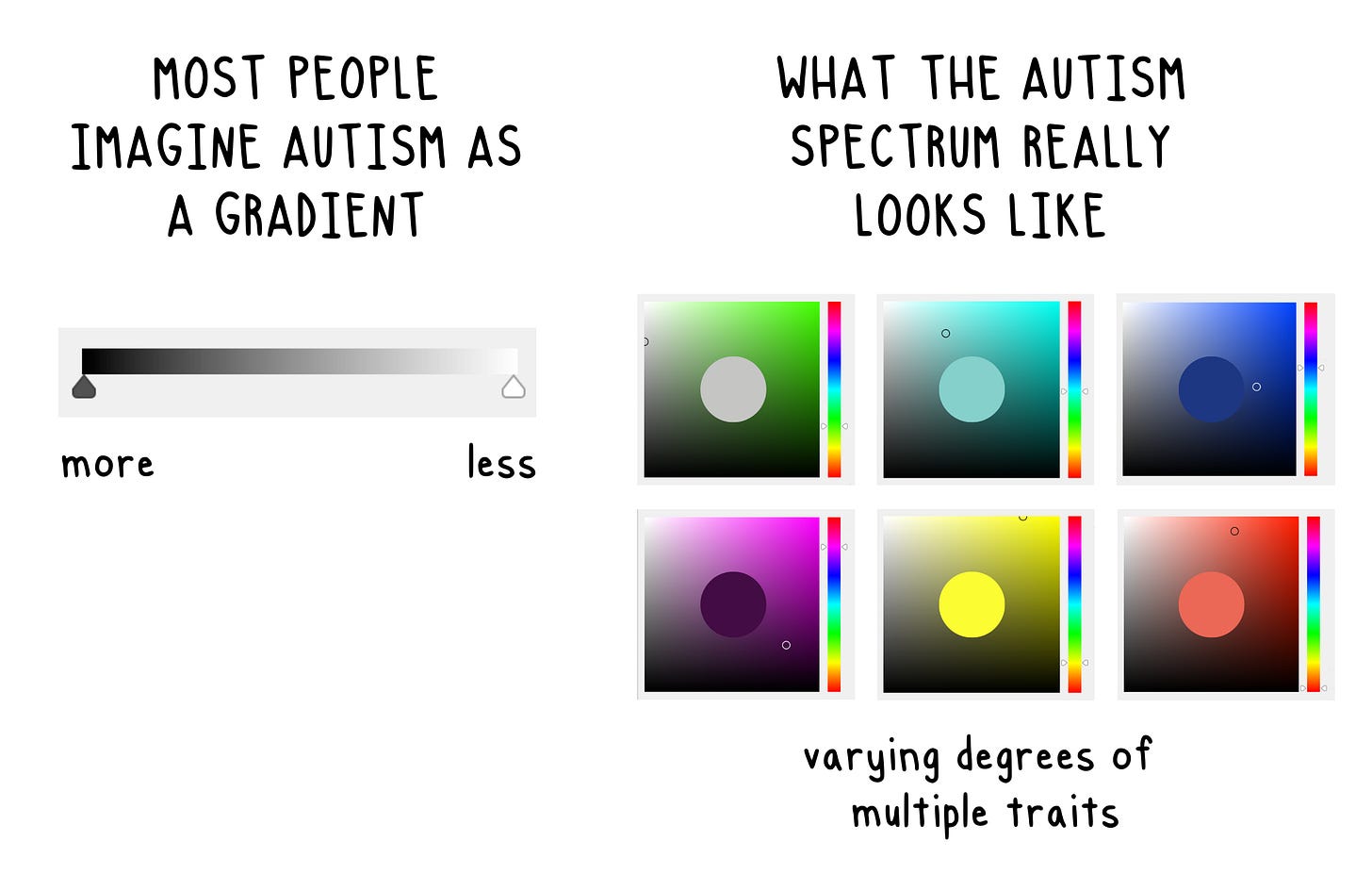
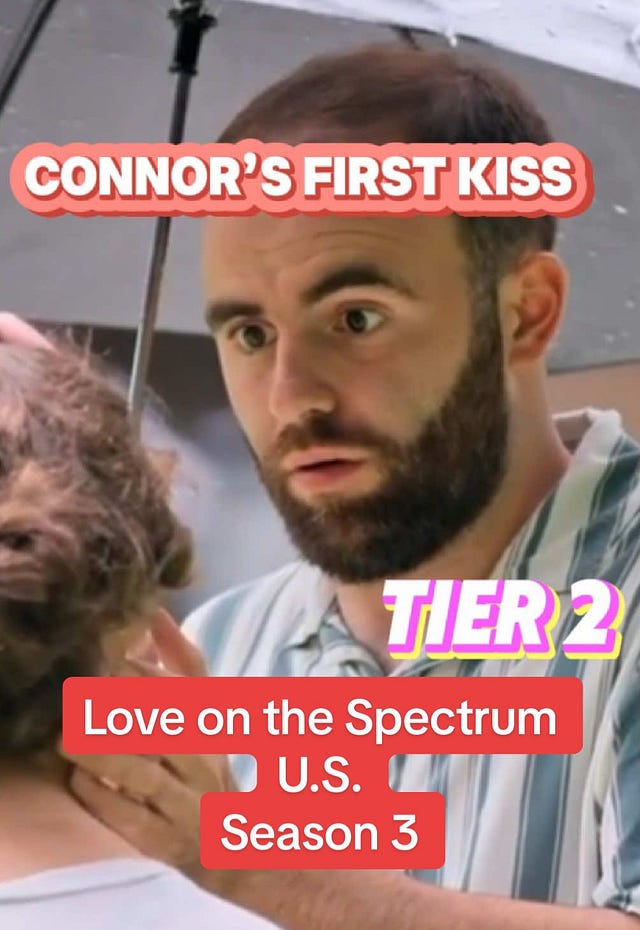

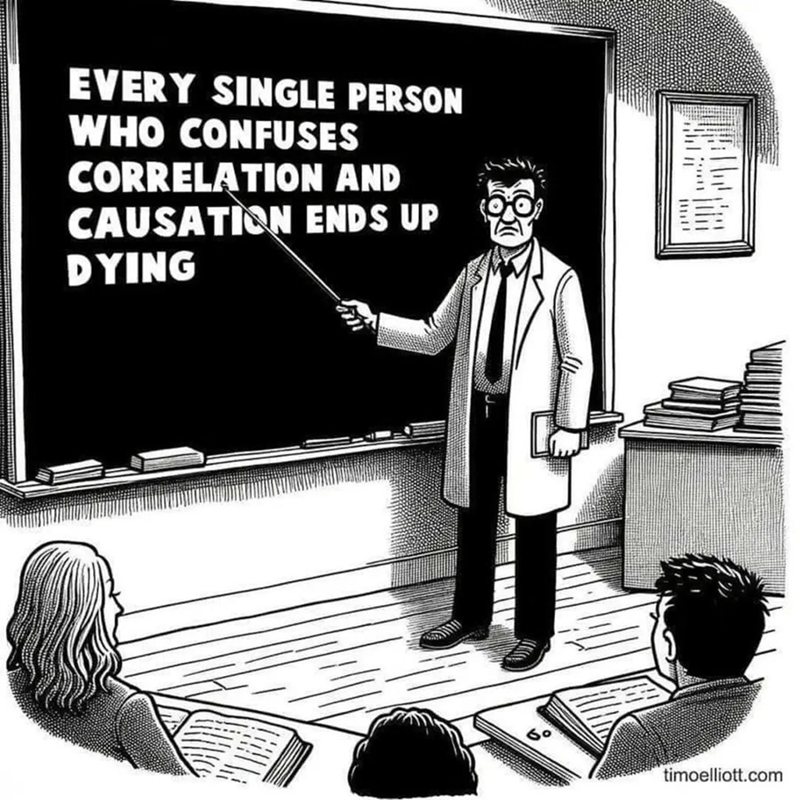
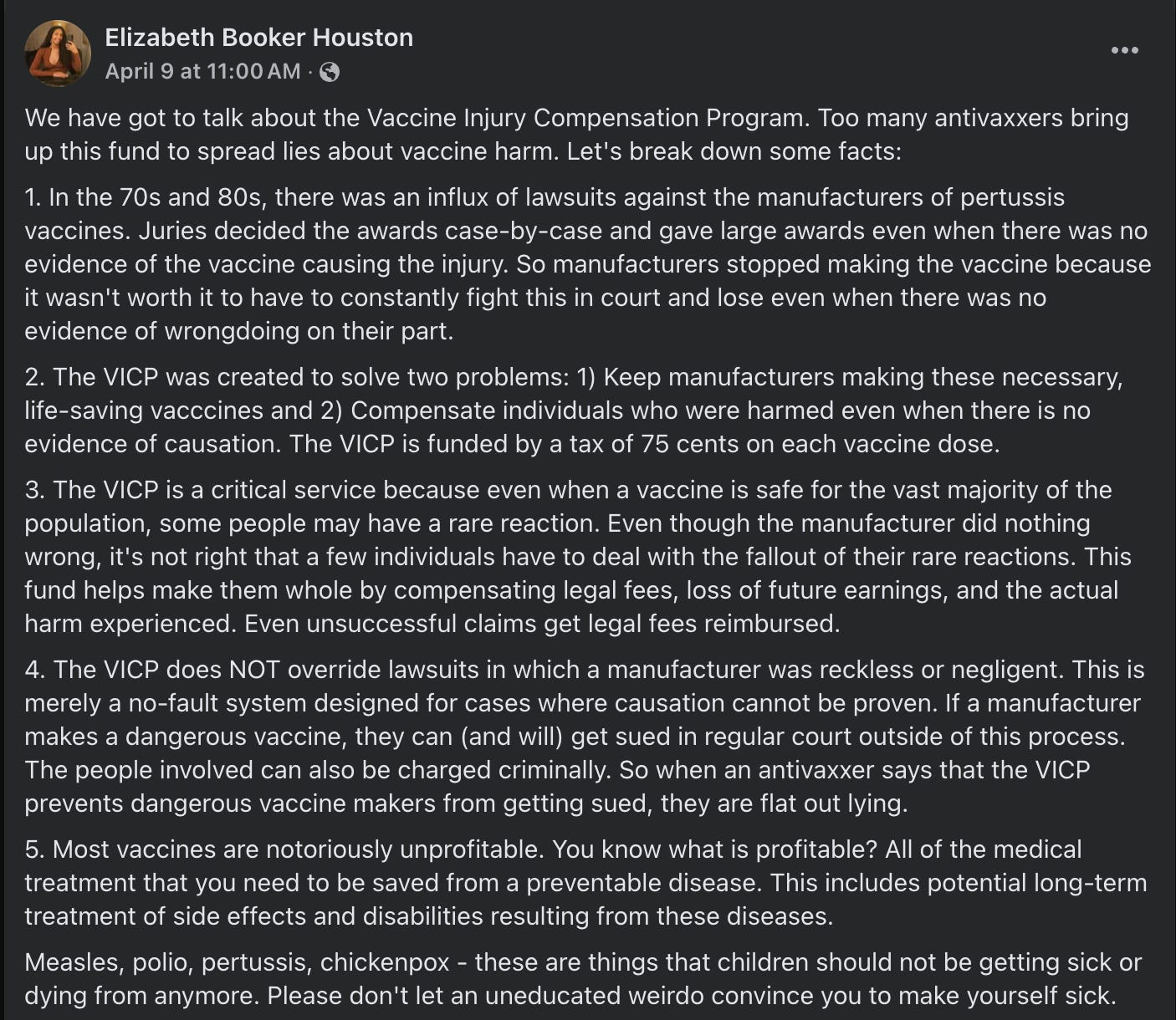

Thank you so much for this piece
Such a good read after watching that frustrating “speech” by RFK. I’m not diagnosed ASD but strongly suspect and this was an amazing read. As someone who struggles with “episodes” like Eva, it was incredible to see her loved and supported 😭💕 wonderful writing that gives me hope in these dark times